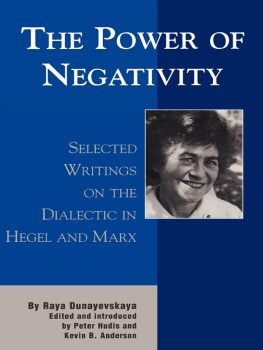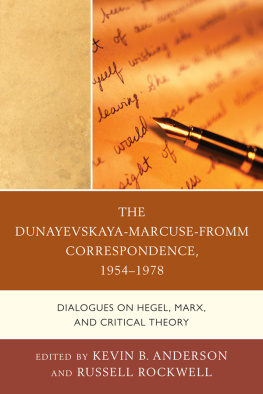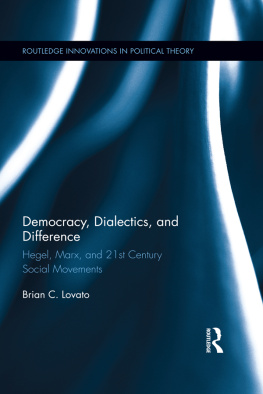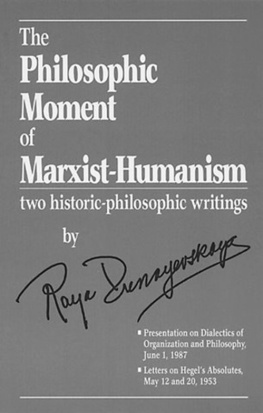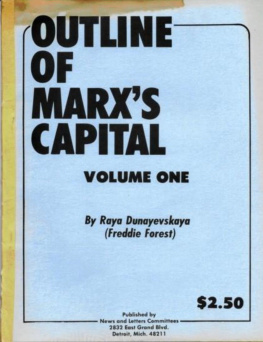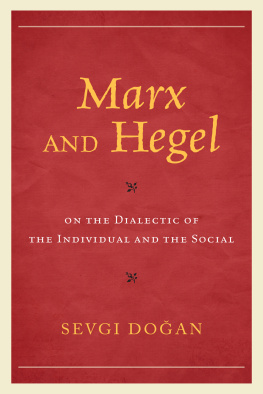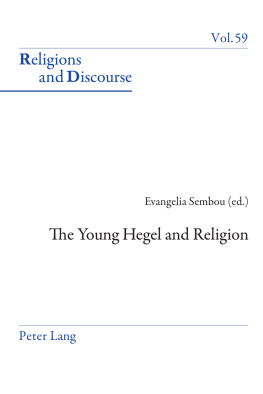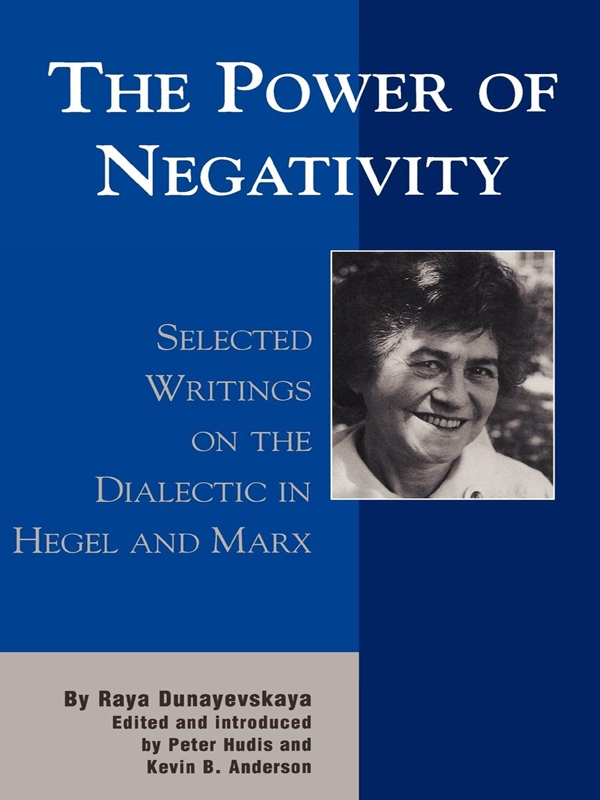Letters to C. L. R. James
The following three letters to C. L. R. James are among Dunayevskayas earliest writings on Hegel and dialectics. From January through March of 1949, Dunayevskaya translated from the Russian Lenins 191415 Abstract of Hegels Science of Logic as well as his Abstract of Hegels History of Philosophy. She shared the typescript of this translation with her two close colleagues at the time, C. L. R. James and Grace Lee Boggs. During the years 194951, they carried out an intensive three-way correspondence in which copies of letters addressed individually were shared by all of them. This correspondence was related to a never-completed joint work on Marxist theory. Dunayevskayas three letters to James published below were written to accompany each of the three parts of her translation of Lenins notes on Hegels Science of Logicthose on Being, Essence, and Notion. In them, she began the close and extensive analysis of Lenins writings on Hegel which was to have an important place in her work for the next 40 years, right up until her death. One can also see here the beginnings of Dunayevskayas direct study not only of Lenin on Hegel, but also of key categories in Hegels Logic in and for themselves. Finally, some early differences with C. L. R. James, including an implicit critique of his emphasis on Essence rather than Notion, can be discerned. Dunayevskaya deposited her copy of the three-way correspondence between James, Lee, and herself in the Raya Dunayevskaya Collection, where it comprises over 150 closely typed pages. Inside the text of the three letters to James printed below, we have given bracketed references to the text of Lenins notes on Hegel as they appear in the 1961 edition of Lenins Collected Works. However, Dunayevskayas translation differs from the Moscow one, in part because she is often more sensitive to dialectical language. Her 1949 translation, which she is quoting here, also differs in some respects from her own subsequently published version in the appendix to the 1958 edition of Marxism and Freedom. The typescript of the 1949 translation from which she was working in these letters can also be found in The Raya Dunayevskaya Collection, p. 1492.
Letter to James of February 18, 1949
Dear J:
I decided to translate the Philosophic Notebooks on the Science of Logic in toto as excerpts cannot avoid the appearance and actuality of being forced. Here is the first section, dealing with the Prefaces, Introduction, and Doctrine of Being. Note that the Leap (translated by Hegels translators as jump) you made so famous in your Notes [on Dialectics (1948)] is not in Quality but in Measure. It is the climax, that is, to entire first volume. He then proceeds to introduce his conclusions with gradualness explains nothing without leaps, then he repeats the title of the Observation as if Nature did not make jumps which he emphasizes further by repeating the word Leaps! at a side, then softly emphasizes Interruptions to gradualness [LCW 38, p. 123] and ends with quoting pages 389-90, It is said, natura non facit saltum [SLI, p. 389; SLM, p. 370] and two more Leaps! follow that. You would think at this point that he feels gaily and can transit to Essence easily. No, he complains here that the end of Vol. I, Transition of Being to Essence is analyzed doubly obscurely [LCW 38, p. 125]. How much that man knew and how much more he was searching for!
You will enjoy the notes on Being which you practically skipped over in your hurry to get to Essence. It seemed to me one of the reasons was the necessity to begin with simplest categories, because both in philosophy, economics, politics and what have you those simple categories contain in germ the whole. An excellent example of this firm grasp of the dialectic at its simplest is his remark, after complaining that Hegel is unclear, or rather he is unclear about Hegels full meaning in Die Objectivitt des Scheins, die Notwendigkeit des Widerspruchs [The Objectivity of Appearance, the Necessity of Contradiction] (inherent negativity) [SLI, p. 67; SLM, p. 56; LCW 38, p. 98]:
Is not this the thought, that appearance is also objective, since it is one of the sides of the objective world? Not only Wesen [Essence], but also Schein [Appearance] are objective. Even the distinction between subjective and objective has its limits. [LCW 38, p. 98]
No wonder that man could write of appearance so profoundly! Imperialism: A Popular Outline.
Another thing that struck me anew was emphasis on Method, Method, Method, the dialectic which it has [comprises] in itself: The first reference to Capital occurs here when he quotes Hegel, not a mere abstract Universal, but as a Universal which comprises in itself the full wealth of Particulars [SLI, p. 69; SLM, p. 58; LCW 38, p. 99]. When you add to his emphasis on the development of thinking through its own necessary laws, his attack against using forms of thought as a means, the attacks both on Kantianism and his thing-in-itself and Transcendental Idealism and its subjectivism, you can see that the concretes which Lenin had in mind when he was reading Logic were both the economic conditions Capital plus the Imperialism he was going to work outand Ideology of the Bernsteins, Kautskys, and, yes, Rosa Luxemburg since in that very period he also made notes on her book. What rich years were 1914-16 for Lenin in his study room!
Evidently for the first time he was struck also by the fact that in the back of Hegels mind when he worked out the self-development of concepts was the whole history of philosophy. (He had made these notes before those on Hegels History of Philosophy.) Along with this was the emphasis on how materialistic rang the sound of Hegels statement, What is first in science has had to show itself first historically [SLI, p. 101; SLM, p. 88; LCW 38, p. 106]. Lenin gave a very, rather truly materialistic interpretation of history as it meant to him also the economic foundations of society. At the same time he contrasts Sophistry and Dialectic in general when he quotes Hegel: For sophistry is an argument proceeding from a baseless supposition which is allowed without criticism or reflection; while we term dialectic that higher movement of Reason where terms appearing absolutely distinct pass into one another because they are what they are, where the assumption of their separateness cancels itself [SLI, p. 117; SLM, p. 105; LCW 38, p. 107]. Both Hegel and Lenin hit at baseless assumptions; this is very important for our work, of course.
Among the baseless assumptions are those that divide finite from infinite by an impassable barrier, or, as Hegel would put it, by making one a this-sidedness and then establishing an other-sidedness, a beyond. It is at this point that he deals with Ought and Barrier as moments of the finite [SLI, pp. 144-45; SLM, pp. 13132], but very briefly; I went back to Hegel very carefully on that, and the correspondence with G [Grace Lee Boggs] on the relation of this to the general contradiction of capitalism you are acquainted with. I will return to that again at another time.

